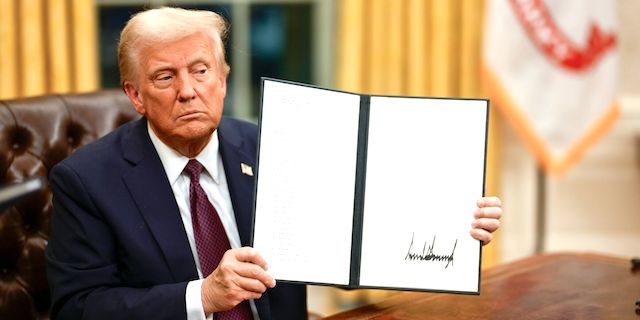ONLINE Dan Fulleton Farm Equipment Retirement Auction
THIS WILL BE AN ONLINE AUCTION Visit bakerauction.com for full sale list and information Auction Soft Close: Mon., March 3rd, 2025 @ 12:00pm MT Location: 3550 Fulleton Rd. Vale, OR […]
Published 12:57 pm Monday, February 3, 2025

President Trump on Saturday raised tariffs on the top three destinations for U.S. farm exports, provoking criticism from China, retaliation from Canada and a deal with Mexico.
Trump posted on social media Monday he had agreed to delay for 30 days adding 25% to tariffs on Mexican goods. In return, Mexico will send 10,000 soldiers to patrol the border.
“These soldiers will be specifically designated to stop the flow of fentanyl, and illegal immigrants into our country,” Trump wrote on X.
The other tariffs — 10% on Chinese goods, 25% on most Canadian goods but only 10% on oil and natural gas — are scheduled to take effect 9 p.m. Monday.
U.S. exported $174 billion worth of agricultural products in 2023, with one-third going to China, Mexico and Canada. The American Farm Bureau said the tariffs could hurt U.S. farmers.
“The uncertainty hits just as operating loans are being secured and spring planting approaches, leaving farmers in a tough spot,” Farm Bureau President Zippy Duvall said in a statement.
Talking to reporters Friday, Trump noted tariffs during his first administration eventually resulted in a deal with China to buy more U.S. farm goods.
“I think there will be temporary, short-term disruptions. People will understand that. I had some of that when I negotiated some of the good deals for the farmers,” he said.
The White House on Saturday issued three executive orders — one for each country. The orders accused China, Mexico and Canada of failing to stop the flow of illegal drugs and illegal immigrants.
Later that day, Canada announced an initial round of 25% tariffs on U.S. products and promised a second round in 21 days.
Canada imposed tariffs on farm products, farm equipment, paper products, building materials, clothes, toiletries and other consumer goods.
“Like the American tariffs, our response will also be far-reaching and include everyday items, such as American beer, wine and bourbon, fruits and fruit juices including orange juice, along with vegetables, perfumes, clothing and shoes,” Canadian Prime Minister Justin Trudeau said at a press conference.
Canadians could help fight the trade war, he said.
“It might mean checking labels at the supermarket and picking Canadian-made products,” he said. “It might mean opting for Canadian rye over Kentucky bourbon, or forgoing Florida orange juice, altogether.”
Trump’s executive order accused China of providing a safe haven for illicit drug making and trafficking. With China’s surveillance capabilities, it should be able to stop the flow of opioids, according to the order.
The Ministry of Foreign Affairs issued a statement Feb. 2 saying China will take up U.S. tariffs with the World Trade Organization.
“The U.S.’s unilateral tariff hikes severely violated WTO rules,” the statement read.
“U.S. needs to view and solve its own fentanyl issue in an objective and rational way instead of threatening other countries with arbitrary tariff hikes,” the statement read.
The influx of illegal immigrants and illicit drugs over the southern border threatens the fabric of U.S. society, according to the executive order related to Mexico
Trump posted on X that he spoke Monday with Mexican President Claudia Sheinbaum and had agreed to a one-month pause in imposing new tariffs “as we attempt to achieve a ‘deal’ between our countries.”
“It was a very friendly conversation wherein she agreed to immediately supply 10,000 Mexican soldiers on the Border separating Mexico and the United States,” the president wrote.
“These soldiers will be specifically designated to stop the flow of fentanyl, and illegal immigrants into our country,” Trump said.
Sheinbaum confirmed the stopgap deal on X. “Mexico will immediately reinforce the northern border with 10,000 members of the National Guard to prevent drug trafficking from Mexico to the United States, particularly fentanyl,” she said.
Sheinbaum added, “the United States is committed to working to prevent the trafficking of high-powered weapons to Mexico.”
Trade wars during Trump’s first term cost farmers a total of $27 billion in lost exports in 2018 and 2019, the USDA estimated. Farmers received $23 billion in compensation.
The Trump administration and China signed a trade deal in 2020, with China committing to buy more U.S. farm goods in 2020 and 2021.
China fell short of its commitment due to diversifying its farm economy and slowdowns in trade caused by COVID, according to a report by the Congressional Research Service.